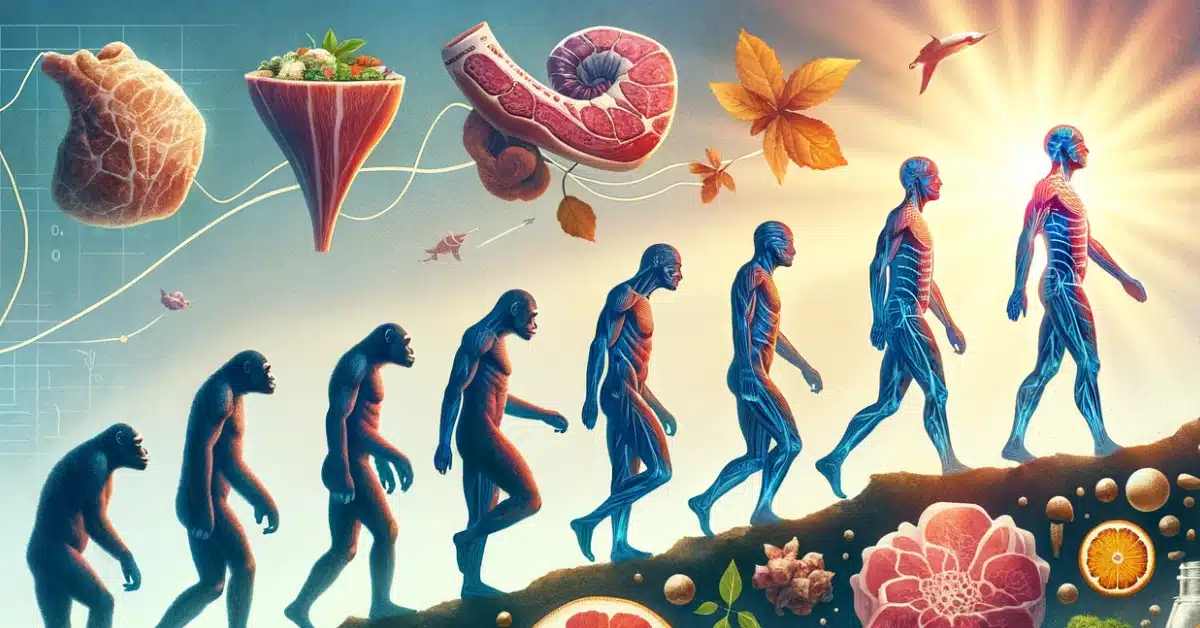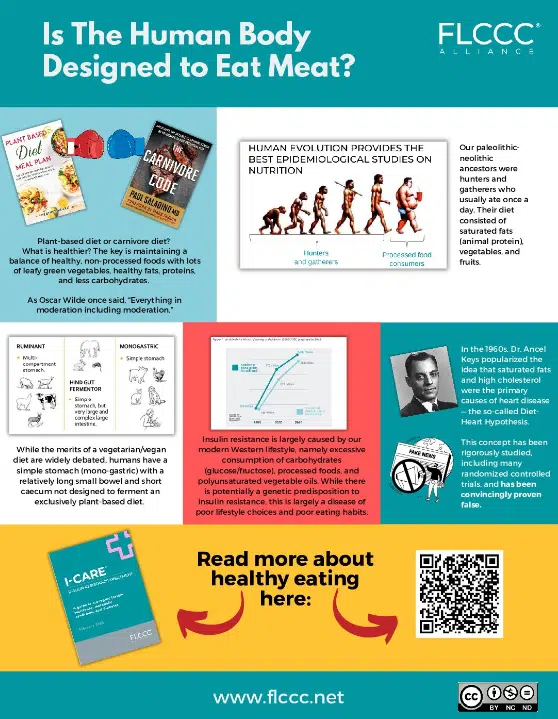Were humans designed to eat meat? If we look at the biological evidence, it’s clear that humans have been eating meat for millions of years.

Is the human body made to eat meat? That’s the issue we’ll clear up today. But first, there’s another important consideration: why are people even asking this question at all?
Modern humans have had some ups and downs when it comes to our diets. For starters, flawed science (funded by the sugar industry) created myths about meat being unhealthy. Advocates of plant-based diets have demonized meat eaters, claiming that fruits and vegetables are “the healthy foods”.
The anti-meat movement got started in the 1960s when Dr. Ancel Keys popularized the idea that saturated fats and high cholesterol were the primary causes of heart disease — the so-called Diet-Heart Hypothesis. And despite that being proven convincingly false by many randomized studies since then, look what it got us:
- Processed foods
- Low-fat foods
- High-sugar foods
- A very confused public
One thing is for sure: our human ancestors wouldn’t recognize most of what we ate! They would, however, recognize meat because it has been a staple of the human diet for at least 2.6 million years.
Take a look at the infographic below or keep reading to learn why humans were always designed to eat meat:
The Evolution of Meat Eating
Whether you believe humans were designed to eat meat or not, we know we’ve been eating meat for a very long time.
How do we know? A number of reasons:
- Use of Tools: About 2.6 million years ago, early hominins like Homo habilis began using stone tools. They probably used these tools to scavenge meat, cut meat, and hunt.
- Dietary Shift: Adding meat to their diet was a key step in human evolution. Meat, packed with protein, fats, vitamins, and minerals, provided essential nutrients and energy.
- Brain Development: Eating nutrient-rich meat is linked to the growth of larger brains in early humans. The nutrients in meat likely supported this development.
- Social and Cultural Evolution: Moving towards hunting and eating meat influenced how early humans worked together, made tools, and formed more complex societies.
- Adaptation and Survival: Eating meat helped early humans adapt to new environments and survive as they moved to different areas with varying food sources.
So… Are Humans Made to Eat Meat?
Evolution seems to suggest humans are supposed to eat meat. But what about biology?
The human body has several anatomical and physiological features that suggest a biological adaptation to meat consumption:
- Omnivorous Dentition
- Digestive Enzymes
- Shorter Digestive Tract
- B12 Consumption
- Liver and Gallbladder Function
1. Omnivorous Dentition
Chew on this: Humans have a mixed dentition (teeth) that includes canines and incisors for tearing, as well as molars for grinding, which is characteristic of omnivores that can process both plant and animal matter.
2. Digestive Enzymes
The presence of specific digestive enzymes, like pepsin in the stomach and pancreatic enzymes, that are effective in breaking down proteins into amino acids.
3. Shorter Digestive Tract
Compared to herbivores (like cows and sheep), humans have a relatively short digestive tract. Our digestive systems are more similar to that of carnivores, which is efficient for digesting meat.
4. B12 Consumption
Vitamin B12, which is essential for nerve function and blood formation, is naturally found only in animal products, suggesting a dietary need for meat.
5. Liver and Gallbladder Function
The liver can detoxify certain byproducts of protein metabolism, and the gallbladder stores bile, which is crucial for the digestion and absorption of fats from meat.

Did Ancient Humans Follow a Plant-based Diet or a Carnivore Diet?
Imagine early man in hunter-gatherer times. Were they hunting for apples or antelope?
Our paleolithic-neolithic ancestors were hunters and gatherers who usually ate once a day. Their diet consisted of saturated fats (animal protein) vegetables and fruits.
The reality is that we know hunter-gatherers often relied heavily on meat for sustenance, and there are a few reasons for this:
- Bioavailability: Meat provides a dense source of nutrients that are highly bioavailable, meaning they can be easily absorbed and utilized by the body. This includes complete proteins, B vitamins (especially B12), iron, and essential fats.
- Seasonality and Availability: Fruits and many plant foods have seasonal availability, while game animals could be hunted throughout various times of the year.
- Energy-Dense: Meat is energy-dense, providing more calories and sustaining energy needs better than most fruits or vegetables, which was crucial for the hunter-gatherer lifestyle.
- Food Preservation: Meat can be dried and preserved for longer periods, whereas fruits and vegetables have a shorter shelf life. This made meat a more reliable food source that could be stored and used in times of scarcity.
- Geographical Variability: In some environments, particularly in colder climates, plant foods were less available, and hunting provided the majority of food resources.
Are We Designed to Eat a Plant-based Diet?
It’s also true that our bodies also have tools to digest and make use of carbohydrates.
Carbs are digested and broken down into simple sugars, which then enter the blood. After that, our pancreas secretes that most famous of hormones, insulin. From there, it’s the job of insulin to move sugar from the blood into the cells where it is used for energy.
The trouble starts when we eat too many carbs (fruit included), which leads to our cells becoming insulin-resistant. And when our cells are insulin resistant, that leads to Type II diabetes.
There are a lot of contributing factors to becoming insulin resistant, but the biggest cause is excessive sugar intake. By eliminating sugar, reducing carbs, and increasing fat and protein, Type II diabetes can be reversed.
👉 Learn more: Check out our Glycemic Index Guide
So yes, our bodies are designed to digest carbs. But it begs the question, if eating carbs for energy causes so many problems, isn’t that proof enough we should limit them?
Insulin resistance is largely caused by our modern Western lifestyle. Namely the excessive consumption of carbohydrates (glucose/fructose) processed foods, and polyunsaturated vegetable oils.
It’s true that there is potentially a genetic predisposition to insulin resistance. However, this is largely a disease of poor lifestyle choices and poor eating habits.
What is Healthier Meat or Vegetables?
As Oscar Wilde once said “Everything in moderation including moderation.”
The key is maintaining a balance of healthy non-processed foods with lots of leafy green vegetables, healthy fats, proteins, and fewer carbohydrates.
Read more about healthy eating here in our Eat Well Guide and in our Complete Guide to Intermittent Fasting. And be sure to check out our always useful blog and visit our tools & guides page for more health guidance!



